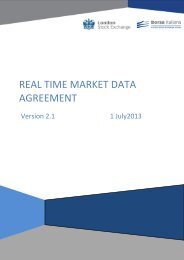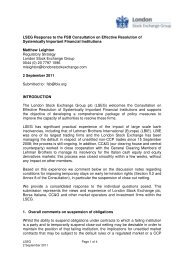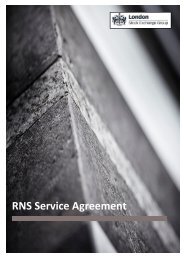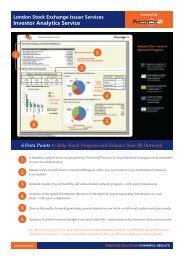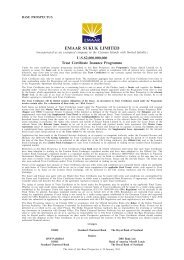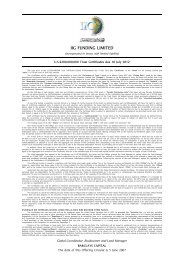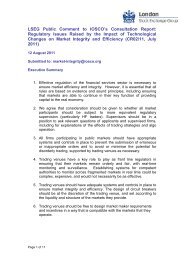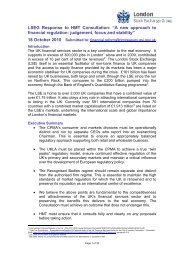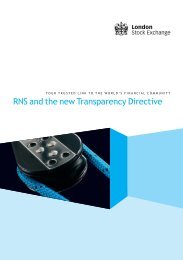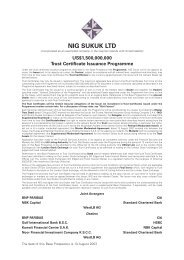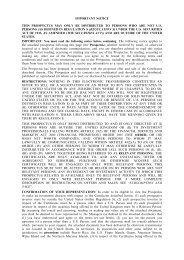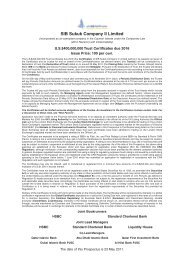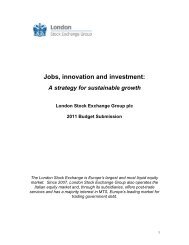Tabreed 06 Prospectus - London Stock Exchange
Tabreed 06 Prospectus - London Stock Exchange
Tabreed 06 Prospectus - London Stock Exchange
Create successful ePaper yourself
Turn your PDF publications into a flip-book with our unique Google optimized e-Paper software.
THE UNITED ARAB EMIRATES<br />
The UAE is a federation of seven emirates made up of Abu Dhabi, Dubai, Sharjah, Ajman, Umm<br />
al-Qaywan, Fujairah and Ras Al-Khaima. Formerly known as the Trucial States, it was a British<br />
protectorate until they achieved independence in December 1971 and merged to form the United<br />
Arab Emirates. Each Emirate has a local government headed by the Ruler of the Emirate. There is a<br />
federal government which is headed by the President. Each emirate enjoys significant autonomy and<br />
has its own budget. The federal budget is principally funded by the two richest Emirates Abu Dhabi<br />
and Dubai.<br />
Location<br />
The UAE is situated along the south-eastern tip of the Arabian Peninsula bordered by Saudi Arabia<br />
to the west and south, and extends to the west coast of the Arabian Gulf from the base of the Qatar<br />
peninsula to Ras Al Khaimah in the north, and across the Musandam peninsula to the Gulf of<br />
Oman in the east, covering an area of 83,699 sq. km. The UAE, with over 700 kilometres of<br />
coastline, has seaports located in both the Arabian Gulf and the Gulf of Oman, which has helped to<br />
establish it as a leading trading hub.<br />
Political Overview<br />
The original constitution of the UAE was initially provisional and provided the legal framework for<br />
the Federation. The constitution was made permanent pursuant to a constitutional amendment in<br />
December 1996 (which also confirmed Abu Dhabi as the permanent capital of the UAE Federation).<br />
The major principle adopted by the Constitution was that jurisdiction for enacting substantive<br />
legislation was confined to the federal government, but the local governments of the seven Emirates<br />
were authorised to regulate those matters that were not the subject of legislation by the federal<br />
government. Consequently, the individual Emirates have exclusive jurisdiction in overall matters,<br />
including those relating to municipal work and natural resources.<br />
The Constitution provided for the establishment of the Supreme Council of the Rulers of all the<br />
Emirates as the foremost authority in the Federation and a Council of Ministers as the executive<br />
branch of the Federation.<br />
The Federation is governed by the Supreme Council of the Rulers. This is the highest federal<br />
governing body and consists of the rulers of the seven Emirates. The Supreme Council elects from its<br />
own membership the President and the Vice President (for renewable five-year terms). Decisions<br />
relating to substantive matters are decided by a majority vote of five Emirates, provided that the<br />
votes of both Dubai and Abu Dhabi are included in that majority, but matters that are purely<br />
procedural are decided by a simple majority vote.<br />
Policy decisions of the Supreme Council are implemented by the Federal Council of Ministers,<br />
sometimes referred to as the cabinet. Upon the approval of the Supreme Council, the President<br />
appoints the Prime Minister and the Federal Council of Ministers to assume the country’s executive<br />
authority. Based in Abu Dhabi, the Cabinet is headed by the Prime Minister and consists of the<br />
Deputy Prime Minister and a number of Ministers. These Ministers are normally selected (for no<br />
fixed term) by the approval of the Supreme Council on the recommendation of the Prime Minister.<br />
The Constitution defines the responsibilities of the Cabinet, which include the issuing of regulations,<br />
the preparation of draft laws and the drawing up of the annual federal budget. Although most of the<br />
federal government ministries are based in Abu Dhabi, many also maintain offices in Dubai.<br />
The federal government is entrusted with the task of enacting legislation regulating the principal and<br />
central aspects of the Federation such as foreign affairs, defence, security, the federal judicial system,<br />
federal finance and loans and civil aviation. Federal matters are regulated through a number of<br />
specially created federal ministries which include the Ministries of Foreign Affairs, Defence, Justice,<br />
Finance and Industry and Economy and Commerce. The responsibility for the armed forces in Dubai<br />
has, within the past three years, been transferred to the federal authorities.<br />
The Federal National Council is composed of 40 members of the national community who are<br />
recommended by the ruler of each Emirate. Each Emirate appoints members for a particular number<br />
of seats, with a large proportion of members coming from Abu Dhabi and Dubai (with eight<br />
members each). The members represent the UAE as a whole rather than their individual Emirates.<br />
Although the Federal National Council does not have any legislative powers, it is responsible for,<br />
among other things, considering and reviewing draft federal laws or bills before they are submitted to<br />
71



